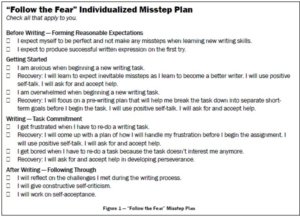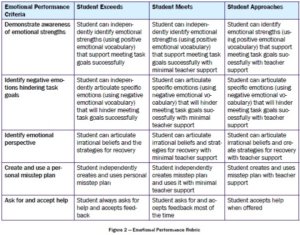This article provides information on overcoming the fear of writing.
Author: Sciortino, P.
Publications: 2e Newsletter
Year: September/October 2014
It’s a rare opportunity when educators get to experience firsthand the same challenges their students face during the learning process. Ironically, this opportunity was given to me as a winner of the Center Theater Group Theater Education Fellowship. I chose to use the financial reward to research my theory that incorporating humor into the writing process would motivate reluctant twice-exceptional writers to persevere through this area of weakness. I enrolled myself in a three-week, intensive comedy writing workshop in New York City. I’m funny; I can write; success was imminent.
Stretching across the back of the theater where the writing workshop took place was a banner stating, “FOLLOW THE FEAR.” I wasn’t sure what it meant in terms of sketch writing. What scary monsters could possibly arise out of comedy writing?
It wasn’t long before the meaning of the directive became all too clear. As hard as I tried, I couldn’t seem to produce a comedy sketch that met the expectations of the teacher or was equal to many of my peers’ sketches. While I began as an eager, motivated learner, I soon became a rationalizing task avoider trying to save face and assuage my fear of failure.
Each morning, I had to brace myself to enter a classroom where I did not shine. Once a strong contributor to class discussions, my class participation began to diminish. I was reluctant to offer constructive criticism to my peers. After all, I thought, if I couldn’t write a perfect sketch myself, why in the world would they trust my opinions about their sketches?
The Emotional Side of Learning
While I didn’t hone my sketch-writing skills as expected, I did learn some valuable things from the class. One is that you can’t separate the emotional self from the process of learning. I understand now that no matter how often I tell my 2e students, “Mistakes are opportunities for learning,” they don’t buy it. They’re too smart to fall for neatly packaged aphorisms. Their own high expectations and those put on 2e learners by parents and teachers can result in what Beverly Trail describes as “…paralyzing anxiety, self-criticism and fear of failure” (p. 2).
From my emotional roller coaster ride trying to master sketch writing, I also learned the importance of teaching my 2e students about the emotional bumps in the road that they can expect to encounter when trying to master new writing skills. I’ve come to see how important it is to explicitly identify the emotional strengths needed to navigate the challenging road that stretches between “I can’t do it” and “Now I can.”
Overcoming the Fear
While researching ways to encourage learners to “follow the fear” during writing skills development, I came across an article about making mistakes on purpose (Letts, 2009). The article presents a strategy for strengthening the skills of — wait for it — table tennis players. As a part of their training, players make mistakes on purpose to practice recovering from those specific mistakes.
This article led me to consider how we, as educators focused on helping learners achieve, might find an advantage in helping our students focus on specific missteps (a word with less “emotional baggage” than Follow the Fear: Anticipating Missteps in Learning to Write mistakes) that might occur along the way to achievement. One possibility is to help our 2e students understand that a misstep is not a signal to give up. Instead, it’s an indication that it’s time to bring out the recovery plan. As the article states, “Because the player is expecting the mistake, he can decide in advance what to do next, allowing him to test out several different methods of recovering from the mistake, in order to find which work best for him.”
One message to give our students, then, is that missteps are inevitable components in any learning process —something to anticipate and prepare for. We can prepare our students for different levels of missteps in the writing process by explicitly identifying them ahead of time. Let’s take a look at some tools that teachers can use to help students anticipate the unexpected “curves in the road” that they might encounter in the writing process and that might prevent them from achieving success.
Some Tools to Use
The first tool is an individualized plan built around missteps that might occur during the writing process. Included in the plan are:
- The emotional perspectives needed for skill mastery
- The behaviors needed for skill mastery
- Specific actions to take to recover from missteps.
With regard to the first bulleted item, the plan might categorize feelings and emotions —both positive and negative —that can surface in 2e learners before, during, and after the writing process. The value of introducing students to and consistently using a vocabulary that describes their feelings and emotions has research-based benefits. According to Lieberman and fellow researchers (2007), “…research indicates that the use of such affective language not only has a physical effect on the brain, but can also alleviate negative emotions.”
Figure 1 shows a sample plan designed to help students identify their emotions during each part of the writing process. Student responses help teachers discover the experiences that deter or promote persistence and follow-through in their students. 2e learners can use it to anticipate emotional behaviors and beliefs that might surface during the writing process and steer them off course.

Another useful tool is an Emotional Performance Rubric, like the one shown in Figure 2 on the next page. It serves as an aid to teachers in measuring their students’ progress, though it’s important to keep in mind that measuring emotional awareness can be tricky. For students, the Emotional Performance Rubric provides explicit knowledge of the emotional goals that form the foundation of their individualized “Follow the Fear” Misstep Plans. In tandem, these tools —the plan and the rubric —provide the basic elements of all skills development: “knowing what” and “knowing how.

Conclusion
Over the course of my three-week writing program, I continued to show up to class; follow my fear; and, over time, identify the emotional pitfalls I was likely to encounter and ways to recover from them. I came away from the experience with a feeling of success —not at having mastered “the how” of sketch writing, but at having the courage to remain engaged in the writing process.
With our 2e students, we must acknowledge that fear of failure exists within everyone, especially when working in areas of skill weakness, and that the strength to push through the fear and recover from missteps is a positive choice made by an individual. Asking these learners to seriously consider the potential for error and to identify steps for recovery will help nurture the emotional strength they need to navigate the inevitable challenges that writing presents for them —challenges that might otherwise send 2e perfectionists reeling into task avoidance and feelings of failure, just as they did me during my brief sojourn as a sketch comedy writer.
Pat Sciortino, M.S. Special Ed., is a 2e learning specialist, improvisational play coach, and creator of “Enter Laughing,” an improvisational play program that taps into twice-exceptional learners’ unique senses of humor to motivate social/ emotional skills development. She has 14 years of experience working with gifted and twice-exceptional students, currently in New York City and previously at The Westmark School and at Bridges Academy in Los Angeles. Prior to becoming a 2e educator and learning specialist, Pat was a professional New York actress and comedian.
Permission Statement
This article first appeared in the September, 2014, issue of 2e: Twice-Exceptional Newsletter and is used here with permission.
Comments